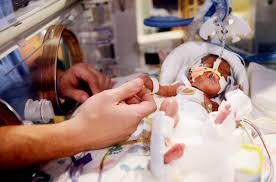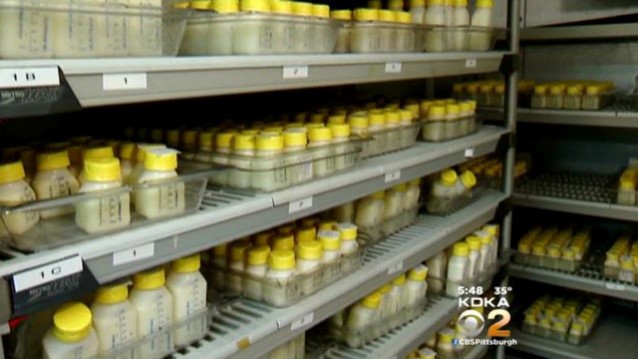
Board President, Nora Peace, of the Three Rivers Mothers’ Milk Bank of Pittsburgh said in an interview “Imagine a cause that can actually save lives and we’re here in Western Pennsylvania.” This is a cause that rings true to her heart. All babies benefit from human milk. Breast milk is even more critical for premature babies and medically fragile infants. It can be life-saving.
In 2012, the American Academy for Pediatrics recommended that all babies weighing 3.3 pounds or less receive human milk. The majority of mothers delivering very premature babies have difficulty establishing a milk supply to fully meet their babies’ needs initially. When a mother’s own breast milk isn’t available due to low supply, HIV, Hepatitis, drug use, on medications etc., the next best option is milk from carefully screened donors. Each donor has a verbal and written interview, a health care provider assessment and a blood test. The expressed milk is pasteurized to eliminate pathogens like bacteria and infections agents. Providing safe milk to babies in need is the mission of The Three Rivers Mothers Milk Bank of Pittsburgh.


Infants that are feed breast milk have a decreased rate of infection, shorter neonatal intensive care units (NICU) stays and fewer incidences of necrotizing enterocolitis or NEC. NEC is a medical condition primarily seen in premature infants, where parts of the bowel undergo necrosis or tissue death. There is a percentage of babies that will die with NEC and a percentage that will end up needing surgery to remove the infected tissue. Infants that have surgery can end up having something called short gut syndrome or short bowel syndrome SBS. This occurs if too much of the colon is removed. Mal-absorption can result in some cases and nutrition will not be adequate which can bring a life time of problems. The first five years of life, insurance companies will cover the cost of short gut babies, which is close to 1.8 million dollars. Since hospitals are now in the business of being a hospital and an insurance company, the release of the findings that breast milk could improve the infants’ recovery and reduce NICU costs, was a good incentive for them to look toward purchasing breast milk.
The use of donor milk by NICUs is becoming increasingly common with 42.5% utilizing it in 2011 compared to just 11.5% in 2007. On average, a case of medical NEC results in $74,004 of additional care and one case of surgical NEC adds $198,040 to the cost of care. On average, $8,167 is saved per NICU infant receiving only breast milk. About 80% of the milk is distributed to NICUs in Pennsylvania and West Virginia when milk from an infant’s mother is not available. The remainder of the milk is given to outpatient infants and babies. The pasteurized and frozen breast milk does not have all the immunity boosting benefits of fresh breast milk from babies’ own mothers, but it is still recommended over formula. The milk bank could potentially impact the formula industries’ ongoing donations to hospitals, which has been a practice for many years.
Denise O’Connor was the brainchild behind the opening of the Pittsburgh site at 3127 Penn Avenue in the Strip District. “Every foundation that we went to totally embraced this project,” O’Connor said. “It’s a simple solution that helps better the lives for the families in need. We’re beyond excited.”The nonprofit’s 5,000-square-foot building includes a pasteurization and bottling laboratory, freezers, a classroom and will soon add a nutritional analyzer for the milk. Pittsburgh’s milk bank is among the 18 in the United States.
Michael A. Fuoco / Pittsburgh Post-Gazette
Human Milk Banking Association of America
Personal interview with Nora Peace, March 20, 2016
KDKA TV